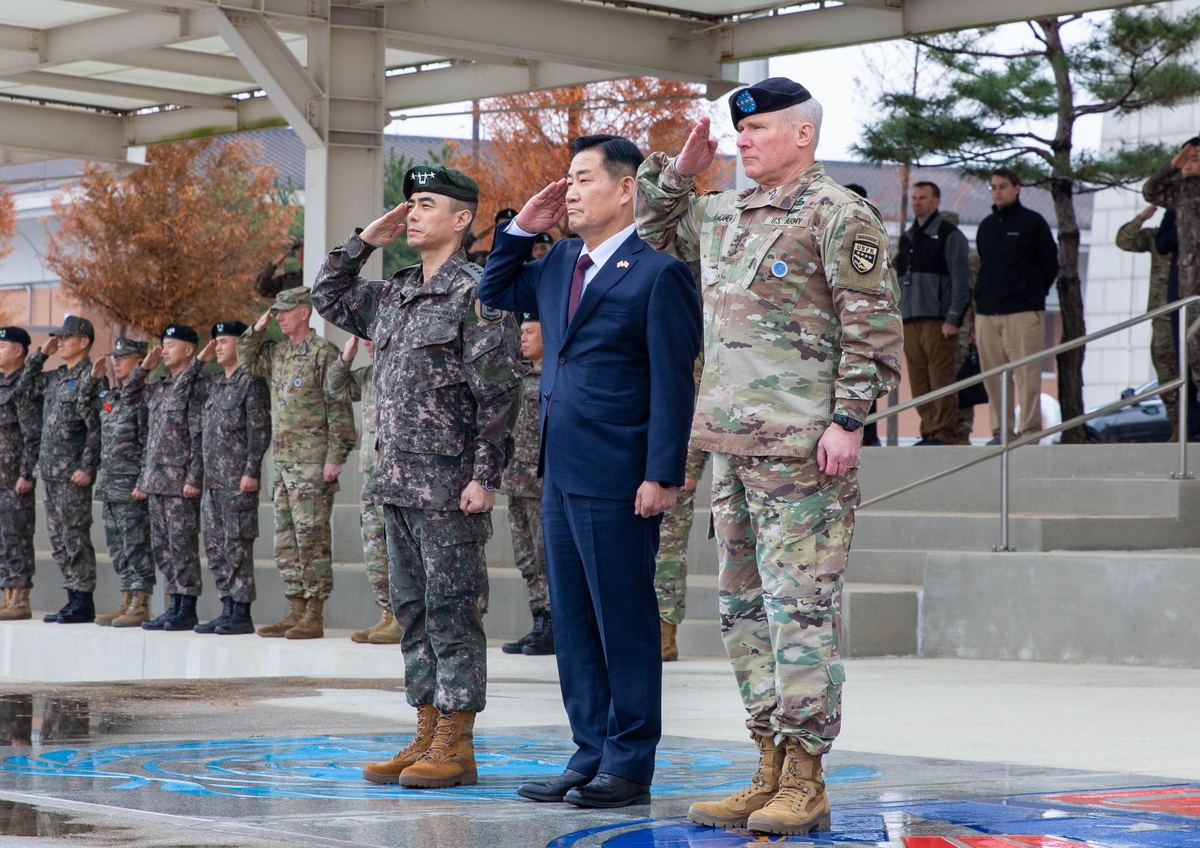- California Assembly OKs highest minimum wage in nation
- S. Korea unveils first graphic cigarette warnings
- US joins with South Korea, Japan in bid to deter North Korea
- LPGA golfer Chun In-gee finally back in action
- S. Korea won’t be top seed in final World Cup qualification round
- US men’s soccer misses 2nd straight Olympics
- US back on track in qualifying with 4-0 win over Guatemala
- High-intensity workout injuries spawn cottage industry
- CDC expands range of Zika mosquitoes into parts of Northeast
- Who knew? ‘The Walking Dead’ is helping families connect
N. Korea restoring guard posts, bringing heavy firearms along inter-Korean border
North Korea has begun rebuilding guard posts and bringing heavy firearms along the border with South Korea after effectively scrapping a 2018 inter-Korean military tension reduction deal, the defense ministry said Monday.
Ministry officials disclosed photos showing North Korean troops installing temporary guard posts, carrying what appeared to be recoilless guns and standing guard at night inside the Demilitarized Zone (DMZ) separating the two Koreas.
These moves came after the North said last week it would restore all military measures halted under the 2018 tension reduction deal. That decision came after South Korea suspended part of the agreement in protest of the North’s successful launch of a military spy satellite.
“Before destroying the GPs, there were observation posts and they are presumed to be rebuilding them. It was made of white wood and painted with a camouflage pattern,” a senior military official told reporters on background, referring to a guard post seen in a photo released by the defense ministry on Monday.
“There are only a few guard posts currently undergoing restoration work, but the North is expected to restore all of them as they are essential facilities for surveillance,” the official added.
Restoration work began on Friday, a day after the North said it was scrapping the deal, officials said.
The Comprehensive Military Agreement was signed on Sept. 19, 2018, at the height of a reconciliatory mood when then South Korean President Moon Jae-in traveled to Pyongyang for summit talks with North Korean leader Kim Jong-un.
The deal called for demolishing border guard posts within 1 kilometer of the border, banning military drills and maneuvers near the land and sea borders, and establishing no-fly zones along the border, among a series of measures designed to reduce military tensions.
At the time, both sides demolished 10 guard posts each and withdrew troops and weapons from them.
In response to the North’s latest move, the defense ministry vowed to keep close tabs on the North’s activities to detect signs of provocations along the border.
“Our military will closely monitor North Korea’s provocative acts, while maintaining the full readiness to be able to retaliate to North Korea’s provocations immediately, strongly and till the end, based on the strengthened combined posture with the U.S.,” the ministry said.
North Korea’s restoration of guard posts has raised speculation that the South Korean military could take further actions in addition to resuming surveillance activities near the border following the partial suspension of the accord.
Gen. Kim Myung-soo, the new chairman of the Joint Chiefs of Staff who took office Saturday, said the South Korean military will take “corresponding measures” in response to the North’s latest move, without elaborating on details.
“It depends on the enemy’s behavior. It is North Korea that has taken actions and broken trust … We will take corresponding measures. Not taking an action would be more foolish,” Kim said during his first meeting with reporters on Monday.
Later in the day, Defense Minister Shin Won-shik visited the South Korea-U.S. Combined Forces Command (CFC) in Camp Humphreys in Pyeongtaek, 60 kilometers south of Seoul, to discuss the security situation on the peninsula with Gen. Paul LaCamera, the commander of the CFC, U.S. Forces Korea and the United Nations Command.
During the visit, Shin condemned the North’s launch of a spy military satellite and taking steps to restore military measures halted under the 2018 pact near the border, calling for the allies’ strong combined defense posture against North Korea’s provocations, according to the ministry.













